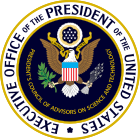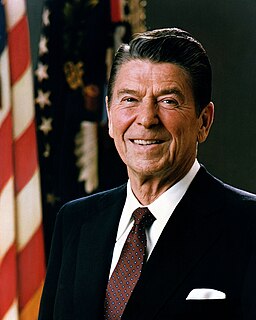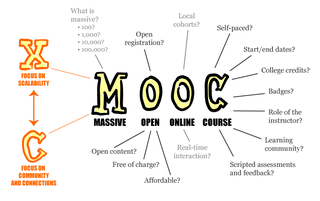The National Academy of Medicine (NAM), formerly called the Institute of Medicine (IoM), is an American nonprofit, non-governmental organization. The National Academy of Medicine is a part of the National Academies of Sciences, Engineering, and Medicine, along with the National Academy of Sciences (NAS), National Academy of Engineering (NAE), and the National Research Council (NRC).
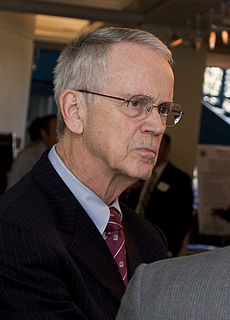
Charles "Chuck" Marstiller Vest was a U.S. educator and engineer. He served as President of the Massachusetts Institute of Technology from 1990 until December 2004, when he was succeeded by Susan Hockfield. He served as president of the National Academy of Engineering from 2007 to 2013.

William Aaron Nierenberg was an American physicist who worked on the Manhattan Project and was director of the Scripps Institution of Oceanography from 1965 through 1986. He was a co-founder of the George C. Marshall Institute in 1984.

William Robert Graham is an American physicist who was Chairman of President Reagan's General Advisory Committee on Arms Control from 1982 to 1985, a Deputy Administrator and Acting Administrator of NASA during 1985 and 1986, and Director of the White House Office of Science and Technology Policy and concurrently Science Adviser to President Reagan from 1986 to 1989. He then served as an executive in national security-related companies.
Calestous Juma FRS HonFREng was an internationally recognised authority in the application of science and technology to sustainable development worldwide. He was named one of the most influential 100 Africans in 2012, 2013 and 2014 by the New African magazine. He was Professor of the Practice of International Development and Faculty Chair of the Innovation for Economic Development Executive Program at Harvard Kennedy School. Juma was Director of the School's Science, Technology and Globalization Project at Harvard Kennedy School as well as the Agricultural Innovation in Africa Project funded by the Bill and Melinda Gates Foundation. His latest book, Innovation and Its Enemies: Why People Resist New Technologies. was published by Oxford University Press in 2016.

Arden Lee Bement Jr. is an American engineer and scientist and has served in executive positions in government, industry and academia. He is a former Deputy Undersecretary of Defense for Research and Advanced Technology, Chief Technical Officer of TRW, Director of the National Science Foundation (NSF) and Director of the National Institute of Standards and Technology (NIST). Following the end of his six-year term at NSF, on June 1, 2010 he became the founding director of the Global Policy Research Institute and Chief Global Affairs officer at Purdue University.
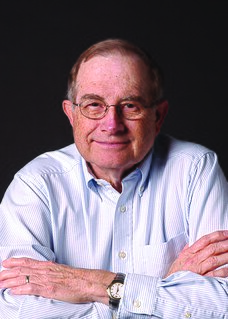
Cornelius (Neal) Francis Lane, is a U.S. physicist and Senior Fellow in Science and Technology Policy at Rice University's Baker Institute for Public Policy and Malcolm Gillis University Professor Emeritus of Physics and Astronomy Emeritus at Rice University in Houston, Texas.
Marina von Neumann Whitman is an American economist, writer and former automobile executive. She is a Professor of Business Administration and Public Policy at the University of Michigan's Ross School of Business as well as The Gerald R. Ford School of Public Policy.

Philip E. Rubin is an American cognitive scientist, technologist, and science administrator. He is known for his pioneering development of articulatory synthesis, and sinewave synthesis, and their use in studying complex temporal events, including understanding the biological bases of speech and language. He is the Chief Executive Officer emeritus and a member of the Board of Directors of Haskins Laboratories in New Haven, Connecticut, where he was also a senior scientist. In addition, he is a Professor Adjunct in the Department of Surgery, Otolaryngology at the Yale University School of Medicine, a Research Affiliate in the Department of Psychology at Yale University, a Fellow at Yale's Trumbull College, and a Trustee of the University of Connecticut. From 2012 through Feb. 2015 he was the Principal Assistant Director for Science at the Office of Science and Technology Policy (OSTP) in the Executive Office of the President of the United States, and led the White House's neuroscience initiative. He also served as the Assistant Director for Social, Behavioral and Economic Sciences at OSTP. For many years he has been involved with issues of science advocacy, education, funding, and policy.

Daniel A. Reed is an American computational scientist, known for his contributions to high-performance computing and science policy. He is vice president of research and economic development at the University of Iowa. He previously served as director of scalable computing and multicore at Microsoft Research. He founded the Renaissance Computing Institute in 2004 and served as its director until December 2007. Reed also was Chancellor’s Eminent Professor and served as senior adviser for strategy and innovation to UNC-Chapel Hill Chancellor James Moeser. He served as CIO and Vice Chancellor for Information Technology Services at UNC-Chapel Hill from June 2004 through April 2007.
Chad Alexander Mirkin is an American chemist. He is the George B. Rathmann professor of chemistry, professor of medicine, professor of materials science and engineering, professor of biomedical engineering, and professor of chemical and biological engineering, and director of the International Institute for Nanotechnology and Center for Nanofabrication and Molecular Self-Assembly at Northwestern University.
Duncan T. Moore was president of the Optical Society of America in 1996 and was awarded the society's Edwin H. Land Medal in 2009.

Cherry A. Murray, Ph.D., is the Benjamin Peirce Professor of Technology and Public Policy at, and former dean of, the Harvard School of Engineering and Applied Sciences (SEAS). In October 2014, she announced via an email to the Harvard community that she would be stepping down from her post at the end of the year, with an interim dean to be named by FAS Dean Michael Smith and a permanent dean following a formal search. She was the 2009 President of the American Physical Society (APS) and Chair of the Division of Engineering and Physical Science of the National Research Council.
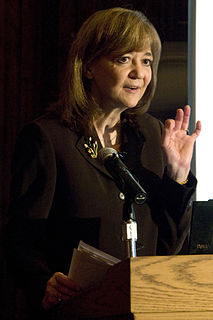
Rosina M. Bierbaum is currently the Roy F. Westin Chair in Natural Economics and Research Professor at the University of Maryland's School of Public Policy. She is also a professor and former dean at the University of Michigan School of Natural Resources and Environment (SNRE). She was hired in October 2001, by then-University of Michigan President, Lee Bollinger.

Manchanahalli Rangaswamy Satyanarayana Rao known by the abbreviation M. R. S. Rao, is an Indian scientist, born on 21 January 1948 at Mysore, India. He has been awarded the fourth highest civilian award Padma Shri in Science and Engineering category by the Government of India. He was the President of Jawaharlal Nehru Centre for Advanced Scientific Research (JNCASR), Bangalore, India (2003-2013)

Mathea Falco is a leading expert in drug abuse prevention and treatment who served as the first U.S. Assistant Secretary of State for International Narcotics and Law Enforcement Affairs during the Carter Administration. Currently, Falco is the President of Drug Strategies, a nonprofit research institute based in Washington, D.C., which she created with the support of major foundations in 1993 to identify and promote more effective approaches to substance abuse and international drug policy.

John Paul Holdren is an American scientist who served as the senior advisor to President Barack Obama on science and technology issues through his roles as Assistant to the President for Science and Technology, Director of the White House Office of Science and Technology Policy, and Co-Chair of the President's Council of Advisors on Science and Technology (PCAST).

William Henry Press is an astrophysicist, theoretical physicist, computer scientist, and computational biologist. He is a member of the U.S. National Academy of Sciences, the American Academy of Arts and Sciences, and the Council on Foreign Relations. Other honors include the 1981 Helen B. Warner Prize for Astronomy. Press has been a member of the JASON defense advisory group since 1977 and is a past chair.
Barry R. Bloom is Harvard University Distinguished Service Professor and Joan L. and Julius H. Jacobson Professor of Public Health in the Department of Immunology and Infectious Diseases and Department of Global Health and Population in the Harvard T.H. Chan School of Public Health in Boston, where he served as Dean of the Faculty from 1998 through December 31, 2008.
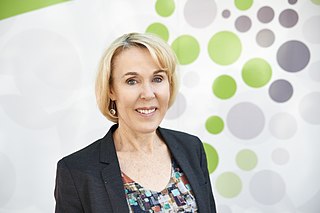
Helen Rees OBE is Founder and Executive Director of the Wits Reproductive Health and HIV Institute of the University of Witwatersrand, which is the university's largest research entity, with a mandate for research, health systems strengthening and training. Wits RHI is a WHO and UNAIDS Collaborating Centre in reproductive health and HIV respectively and is also a South African Medical Research Council Collaborating Centre in HIV and TB.
